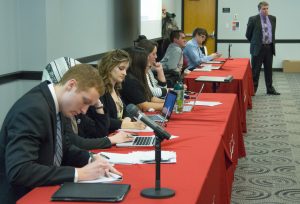A panel of 10 University of Indianapolis students and two Indiana University–Purdue University Indianapolis students came to the UIndy campus for the “Energy Plan Community Conversation” on Tuesday, Jan. 31, at 7 p.m. These students are interns working with former Mayor Greg Ballard to create one of Indiana’s first clean energy plans.
According to energy plan intern and junior biology major Rowan Farrell, the internship is very research-based, and the students have learned a lot more than they knew when they came in. The students meet twice weekly to discuss the plan.

The event began with a poll that the audience took online to illustrate the public’s knowledge of renewable and nonrenewable resources. Then the students broke down clean energy into four different categories: residential, commercial, industrial and transportation. Then they explained what incentives the state of Indiana or companies in Indiana already offered to those who use clean energy in each category.
In the residential category, Indiana currently has consumer tax credits on efficient energy appliances up to $1,000 and 50 percent off the cost of installing the appliances. A property tax deduction for the use of solar, wind and geothermal energy also is provided by the state.
In the commercial category, the state of Indiana offers a federal tax credit up to $1,000 for electric vehicles and hybrid-electric vehicles. The state also provides incentives for Leadership in Energy and Environmental Design certification on commercial buildings.
In addition to the incentives already offered, the interns also have created a list of propositions under each category that they would like to see Indiana offer to clean energy users. Some of the propositions the interns want to propose include an improvement of building codes, a requirement that all new residential and commercial buildings be LEED certified and an increase in efficient heating and cooling systems, solar panels and gray water systems, which collect the water from sinks and showers for use in restrooms and sprinklers.
They also want to encourage microgrids—which are localized energy grids within a neighborhood that has the ability to disconnect from the larger, main grid—and the use of IPL’s home energy assessment. IPL’s home energy assessment consists of IPL representatives coming into a person’s home, assessing energy use and then replacing items, such as light bulbs, shower heads and sink faucets with items that will save energy such as LED light bulbs, for free.
The students plan to take the information they have researched and their propositions and present these to state legislators, with Ballard’s help, to have a policy created in support of clean energy.
Ballard said that a big obstacle he and the interns will have to overcome is educating the state legislators on the issues of climate change and clean energy.
“They [Indiana state legislators] are busy, and they’re trying to do the right thing,” Ballard said. “Sometimes they miss that, but they’re kind of wedded to what they’re doing on a day-to-day basis. There’s not a lot of people, necessarily, that kind of see into the future. They don’t study these subjects in depth, and we have to help them. It is an educational process.”
The event concluded with the panel of interns answering questions and taking advice from the audience.
During the question-and-answer session, Ballard stressed that educating the public and Indiana state representatives is a responsibility shared by those educated on clean energy.
“They [the people] just want the light on; they don’t necessarily know or should know everything behind it,” Ballard said. “So I think it’s counting on some people who do know that and why it’s important in the future to try to get the word out. How we want to turn that light on might be different in the future, and it’s important for all of us to do that.”
Energy plan intern and senior earth-space science major Carly Nicholson believes that people and policy makers need to pay more attention to science.
“Science is absolutely everything, whether you want to believe in what we’re doing or not,” Nicholson said. “It’s the future and it’s what the millennial generation wants.”







